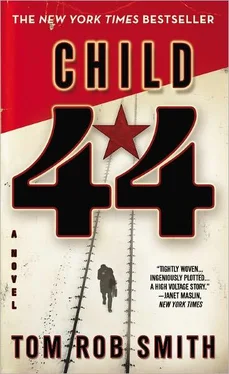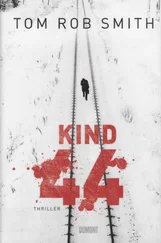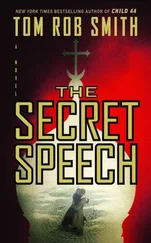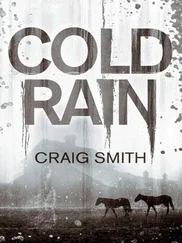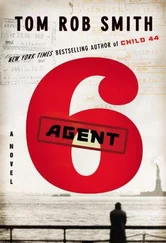— Fyodor, we know Leo came to Moscow recently. I now believe that rather than spying, this journey was in fact part of his investigation. You see, he believes that a murder took place here. Your son was murdered, am I correct?
— No, sir. He was killed in an accident. He was cut down by a train.
— Leo was sent to deal with the matter?
— Yes, but—
— And at the time you believed that the boy was murdered, am I right?
— At the time, I was upset, it was very difficult…
— So, when Leo came back to Moscow to investigate, it wasn’t your child that he was interested in?
— No, sir.
— How do you know?
— Sir?
— How do you know what Leo was or wasn’t interested in?
Vasili took a seat, glancing at his fingernails, pretending to be hurt.
— Fyodor, you obviously have a very low opinion of me.
— That’s not true, sir.
— You must understand that if Leo is right, if there is a child-murderer, then he needs to be caught. I want to help Leo. Fyodor, I have children of my own. It is my duty as a father and as an officer to stop these terrible crimes. This supersedes any personal animosity that exists between Leo and myself. If I wanted Leo dead, I would simply do nothing. At the moment everyone considers both him and his wife to be spies. They will be shot on sight and I fear their investigation will be lost. More children will die. However, if I had all the facts, I might be able to persuade my superiors to call off the man hunt. If I don’t, what chance do Leo and Raisa have?
— None.
Vasili nodded, pleased with the confirmation. It was true, then: Leo was convinced that there was one man responsible for all these deaths. Vasili continued.
— My point exactly, they have no money; they’re hundreds of kilometres from their destination.
— Where did they escape?
Fyodor’s second mistake, revealing that he too believed Leo would be intent on catching this killer. All Vasili needed now was the destination itself. He pointed east of Moscow, the train lines, and watched as Fyodor’s eyes moved from that position, across the map, southwards. Leo was heading south. But Vasili still needed a name. Coaxing Fyodor, he remarked:
— The majority of the murders are taking place in the south.
— Just from glancing at this map…
Fyodor paused. It was possible to tip Vasili off without incriminating himself. They could then jointly petition their superior officers to change their mind about Leo and Raisa. Fyodor had been looking for a way to help them. This was it: he’d turn them from villains into heroes. When they’d met in Moscow, Leo had mentioned that a militia officer had travelled to Rostov to confirm that the city was the most probable location of the killer. Fyodor pretended to scrutinize the papers.
— Judging from the concentration of the murders, I’d say the city of Rostov-on-Don. All the early murders were in the south. He must live there or somewhere near there.
— Rostov?
— What do you think is the best way of convincing our superiors?
— I need to understand everything. We’d be taking a great risk, putting our necks on the line. We have to be sure. Show me again, why do you believe this killer lives in the south?
With Fyodor engrossed in the documents, talking about this and that, Vasili stood up, stepped around the desk, drew his gun and aimed at Fyodor’s heart.
South-Eastern Rostov Oblast
14 July
Leo and Raisa were in a crate one metre high and two metres wide: human cargo — contraband — in the process of being smuggled south. After the military had completed their search of the kolkhoz , the villagers had taken Leo and Raisa by truck to the nearest town, Ryazan, where they’d introduced them to friends and family. In the stifling heat of a small apartment filled with an audience of nearly thirty and the fog of cheap cigarette smoke, Leo had told the story of their investigation. No one needed any convincing as to the urgency of the objective and no one had any difficulty believing that the militia had proved useless in dealing with the killer. They’d never turned to the militia for help or taken their disputes to the authorities, always depending on each other. This was the same, except at stake were the lives of an unknowable number of children.
Together, as a collective, plans were laid to transport them south. One member of the audience worked as a truck driver shuttling loads between Moscow and towns such as Samara and Kharkov. Kharkov was some three hundred kilometres north of Rostov, half a day’s drive. Though it was decided that driving into Rostov itself was too risky since the driver had no business there, he’d be prepared to take them to the nearby town of Shakhty. He could legitimately pass off this diversion by claiming that he was visiting family. That same family would, after listening to the story, almost certainly agree to help Leo and Raisa travel into the city.
At the very least they had a day and a half in this crate, cooped up in complete darkness. The driver was transporting bananas, luxury exotic goods intended for the spetztorgi . Shops for high ranking Party figures, the kind of shops Leo and Raisa once bought their own groceries in. Their crate was positioned at the back of the truck wedged under other crates all filled with precious fruit. It was hot and dry and the journey uncomfortable. There were breaks every three to four hours when the driver would stop, slide off the crates above them, letting his human cargo stretch their legs and relieve themselves by the side of the road.
In complete darkness, with their legs crossed over each other, in opposite corners of the crate, Raisa asked:
— Do you trust him?
— Who?
— The driver.
— You don’t?
— I don’t know.
— You must have some reason for asking?
— Of all the people listening to the story he was the only one who didn’t have any questions. He didn’t seem to engage with it. It didn’t shake him as it shook the others. He seems blank to me, practical, unemotional.
— He didn’t have to help us. And he’s not going to be able to betray us and then go back to his friends and family.
— He could make something up. There was a roadblock. We were caught. He tried to help us but there was nothing he could do.
— What do you suggest?
— At the next stop, you could overpower him, tie him up and drive the truck yourself.
— You’re serious?
— The only way to be sure, to be absolutely certain, is to take his truck. We’d have his papers. We’d have our lives back in our hands, back under our control. We’re helpless like this. We don’t know where he’s taking us.
— You were the one who taught me to trust in the goodness of strangers.
— This man isn’t like the others. He seems ambitious. He spends his entire day transporting luxury items. He must think: I want that, I want those fine textiles, those rare foods. He understands that we’re an opportunity. He knows how much he can sell us for. And he knows the price he’ll pay for being caught with us.
— I’m hardly the one to say this, Raisa, but you’re talking about an innocent man, a man who seems to be risking his life to help us.
— I’m talking about guaranteeing that we reach Rostov.
— Isn’t this how it starts? You have a cause you believe in, a cause worth dying for. Soon, it’s a cause worth killing for. Soon, it’s a cause worth killing innocent people for.
Читать дальше
